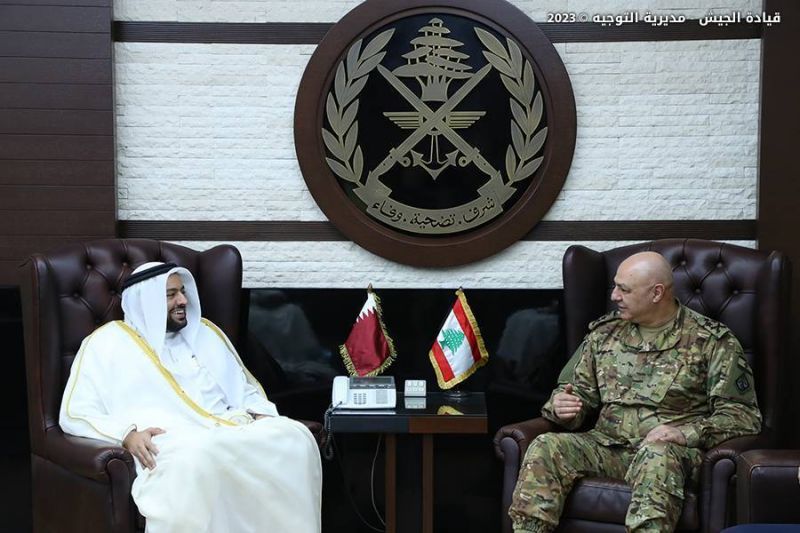
Army Joseph Aoun speaks with Qatari Foreign Minister Mohammad bin Abdel Aziz al-Khulaifi, in Yarzeh, April 4, 2023. (Credit: Lebanese Army)
Tuesday's quintet meeting in New York, consisting of the United States, France, Saudi Arabia, Qatar and Egypt, confirmed that the challenges faced by the French mission in addressing Lebanon's presidential crisis are clearing a path for another mediator to step in.
Qatar seems poised to take on this role.
According to an anonymous source familiar with recent discussions involving the French envoy to Lebanon, Jean-Yves Le Drian, the transition of responsibility to Qatar should occur by December. Qatar's potential involvement is seen as more effective, with a better chance of making a breakthrough in the presidential impasse.
“The Qataris are ready to enter the fray,” said Joseph Bahout, Director of the Issam Fares Institute at the American University of Beirut. “For the time being, nothing is definitive before a clearer Saudi-American agreement is reached.”
“Despite the fact that Paris is not fully embracing this notion, the page has been turned on the French initiative, with no clear substitute in sight,” he added.
The shift is expected to unfold quickly in light of the recent disagreements between France and the US on the sidelines of the UN General Assembly. The US representative Victoria Nuland, Under-Secretary of State for Political Affairs, insisted on establishing a deadline for the French mission to yield results.
Saudi Arabia, having aligned itself with Washington's stance within the quintet from the outset, is unlikely to object to Doha's potential role. Riyadh has fostered strong relations with Qatar since resolving a longstanding dispute in January 2021.
“The coordination between Saudi Arabia and Qatar is exceptionally strong, happening at the highest levels,” said Khaled Batarfi, a Saudi analyst with close ties to the kingdom's authorities. “It's worth noting that the US places greater trust in Qatar than in France.”
Riyadh, weary of the disappointments resulting from the lack of commitment by Lebanese officials, has chosen to distance itself from the Lebanese issue. According to Batarfi, Saudi Arabia has no objections to a third party assuming a prominent role in resolving the presidential impasse.
Qatar's strong points
The speculation that Qatar might take the lead after France is rooted in Qatar's growing influence in this context.
Qatar boasts extensive experience with the Lebanese political establishment since the Doha Agreement in 2008. This agreement effectively paved the way for the election of a new president, Michel Sleiman.
Qatar maintains good relations with different factions in Lebanon — notably Hezbollah and the Free Patriotic Movement — and with Iran. Even radical Christian parties that united against Le Drian's mission are supportive of Qatar's mission, which makes it less likely to encounter resistance.
“Qatar has a long history of diplomacy and holds a weapon that is otherwise a deterrent: Financial incentives, which are generally very attractive to the Lebanese,” said Riad Kahwaji, an expert on the Gulf states.
“If Qatar succeeds in charting a path forward, it will undoubtedly bring out the checkbook, just as it did in 2008 when it played a pivotal role in solidifying inter-Lebanese reconciliation,” said Karim Bitar, a political scientist.
A difficult task
This would not be the first Qatari intervention in Lebanon. In 2006, Doha played a significant role in the reconstruction efforts following the 33-day war between Israel and Hezbollah.
More recently, as one of the world's wealthiest nations, Qatar has channeled millions of dollars into Lebanon. Initially, it provided essential supplies, and more recently, it has been covering the salaries of soldiers, a responsibility that the Lebanese state has not been fulfilling.
In January, Qatar Energy, a state-owned entity, made a significant decision to reinstate its investments in Lebanon. It acquired a 30-percent stake in the consortium responsible for exploration and drilling in Lebanon's offshore waters for oil and gas resources. This consortium includes Italy's ENI and France's TotalEnergies, following the withdrawal of Russia's Novatek.
Doha is cautiously extending its influence in Lebanon, replacing Riyadh, which lost interest in the Lebanese scene.
If it succeeds in making a breakthrough once again, Qatar will be able to claim another soft power victory and position itself as a peacemaker.
“It will then have proven, once again, its ability to play with several [antagonistic] players at once,” said Michael Young, editor-in-chief of Diwan, an online publication of the Malcolm H. Kerr Carnegie Middle East Center.
However, Qatar's mission is not without challenges, despite its advantageous position. Its transparent leanings toward supporting the candidacy of the Lebanese Army's Commander-in-Chief, Joseph Aoun, could strain its amicable relations with Hezbollah.
Hezbollah stated that it “has no problem with him [Joseph Aoun].”
“Clearly, Hezb does not want to alienate the head of the army,” Bitar said. “This issue will be key to the success or failure of the initiative.” Doha will also need to persuade Bassil, a vocal opponent of Aoun, to reconsider his stance.
Qatar is unlikely to endorse a pro-Syrian candidate. There are several reasons for this stance, beginning with Qatar's strained relations with Damascus. Qatar has faced accusations, even from its Gulf counterparts, of fueling Islamist radicalism during the Syrian conflict in 2011.
Moreover, Qatar is unlikely to jeopardize its positive relations with both Washington and Riyadh, both of which would strongly object to a candidate with close ties to Syria.
In essence, Doha will need to find a solution that is acceptable to not only Iran but also Saudi Arabia and the US — a challenging task indeed.
This article was originally published in French in L'Orient-Le Jour. Translation by Sahar Ghoussoub.